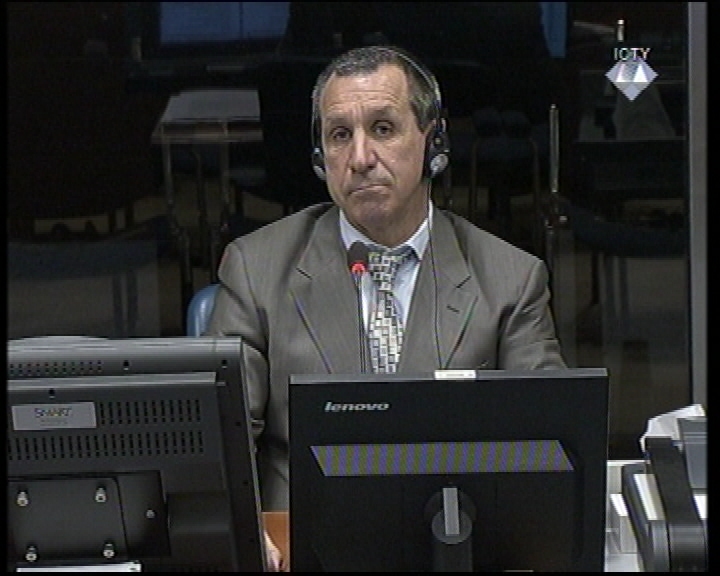Home
CONSPIRACY AGAINST SERBS, UN’S PARTIALITY AND BOSNIAK AGGRESSION
In his evidence in Ratko Mladic’s defense, Russian colonel Andrei Demurenko talked about his investigation of the Markale incident of 28 August 1995. A total of 43 citizens of Sarajevo were killed and 75 were injured in the incident. According to Demurenko, the explosion was staged. The United Nations were biased and covered up the ‘Bosniak aggression against Serbs’. Bosniaks opened fire on their own people, Demurenko claimed
 Andrey Demurenko defense witness in the trial of Ratko Mladić
Andrey Demurenko defense witness in the trial of Ratko Mladić Retired Russian military colonel Andrei Demurenko gave evidence at the trial of Ratko Mladic. Demurenko spoke about his investigation of the Markale incident. He already testified about the issue twice before the Tribunal – at the trials of Dragomir Milosevic and Radovan Karadzic. Both times Demurenko failed to convince the judges and both Trial Chambers rejected his findings, which purportedly proved that the VRS wasn’t responsible for the Markale incident.
Today, in his third appearance before the Tribunal, Demurenko explained that he had been permitted by his superior officer, General Bachelet, to conduct the investigation. The statement made by the UNPROFOR spokesperson, according to whom the Serb side was responsible for the incident, incensed him. Even though the official investigation was still ongoing, Demurenko told Bachelet that he had enough of ‘lies’ and said he would like to conduct an investigation on his own. Bachelet ‘nodded his head’ in approval. Demurenko then set up an ‘expert group’ of Russian artillery officers and toured the Serb positions along the line from which the shell had been fired. In his investigation Demurenko concluded that the Serb troops could not have fired the shell and announced his findings in an interview to the AP news agency.
After the investigation Demurenko went to see General Bachelet and apologized for going public with the results of his investigation without clearing it with the general. Bachelet told him that he ‘will undoubtedly face serious problems in the near future’. According to Demurenko, Alexander Ivanko told him that General Smith had ordered his immediate dismissal, but then changed his mind after he was told it would make Demurenko a hero and that Smith would appear as the person trying to obstruct justice in the eyes of the public. Smith purportedly said that Demurenko would be ‘killed’ anyway. According to Demurenko, Captain Silajdzic, the Bosnian liaison officer with the UN, made a similar threat. Silajdzic purportedly wanted Demurenko to know he had ‘just one day to live’.
Yet again, Demurenko said that the odds that a shell would hit such a narrow street in Sarajevo were ‘one in a million’. Also, as Demurenko explained, a single shell couldn’t have killed so many people given that ‘a part of the shell failed to explode’. When he saw that, it occurred to him that the explosion could have been staged to blame the Serbs.
In the first part of his evidence Demurenko also noted that in the opinion of 60 percent of the UN personnel in Sarajevo, Serbs were the aggressors because ‘their commanding officers and the media presented it that way’. The remaining 40 percent, most of them French, thought that the ‘Muslim religious fanaticism was the main cause of the war, coupled with their unwillingness to accept the other side’s opinion and their ‘delusion’ that they would get support from the Western forces. Demurenko based his view on his ‘feeling’ that most of the people believed that ‘Serbs were to blame for everything’. Also, Demurenko claimed that the Muslim side had opened fire on its own people.
According to Demurenko, UN military observers were ‘biased’ and they ‘covered up the Bosniak aggression’ against the Serbs, as evidenced by their reports. They also covered up the fact that weapons were smuggled into the city in humanitarian convoys. When Judge Orie asked Demurenko to corroborate his claim about the military observers’ partiality with documents, Demurenko said he couldn’t do that. If he had known that he would be asked to produce documents, he would have brought them with him, Demurenko told Orie.
The Russian colonel will be cross-examined by the prosecution tomorrow.
Linked Reports
- Case : Mladic
- 2016-06-01 PROSECUTION: REJECT MLADIC’S MOTION
- 2016-05-20 WHO CAN(NOT) WRITE RATKO MLADIC’S JUDGMENT?
- 2016-05-03 IT DOES NOT MATTER IF VICTIMS WERE ARMED OR NOT, AS LONG AS THERE WAS FIGHTING
- 2016-06-15 CONFUSED COLONEL AND SOPHISTICATED PROSECUTOR
- 2016-06-16 DEMURENKO LEFT BEFORE COMPLETING EVIDENCE
- 2016-06-23 DEFENSE: POSTPONE CLOSING ARGUMENTS UNTIL JANUARY 2017
